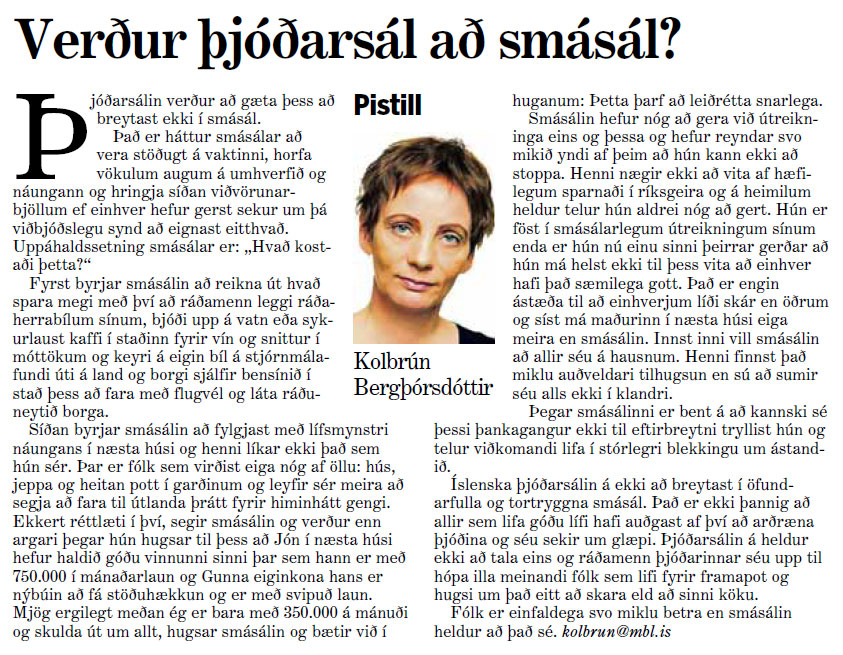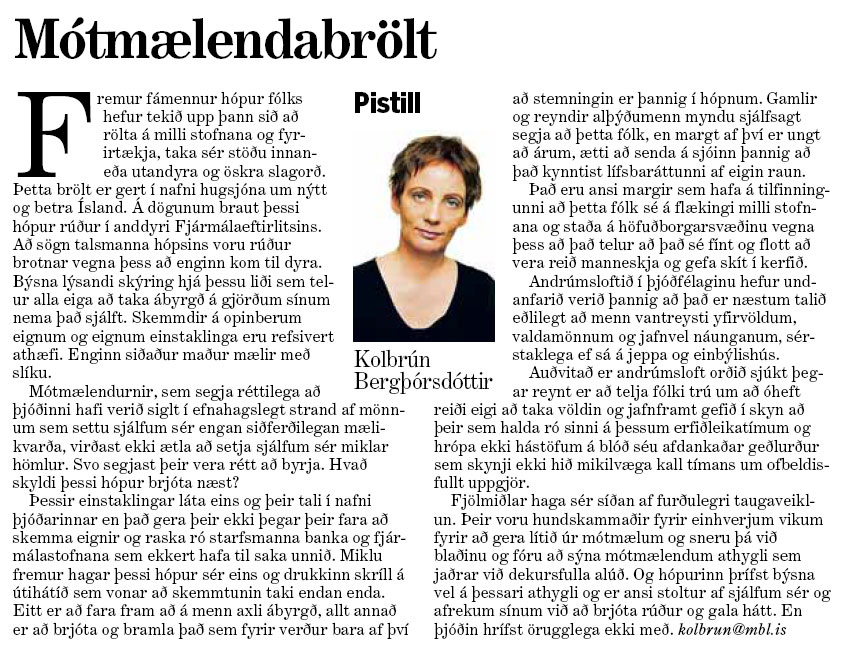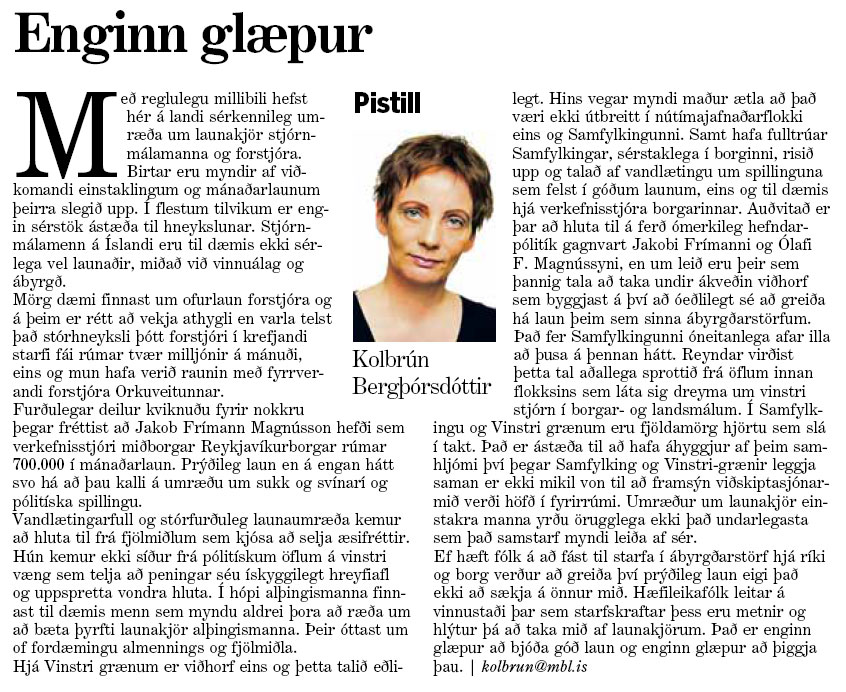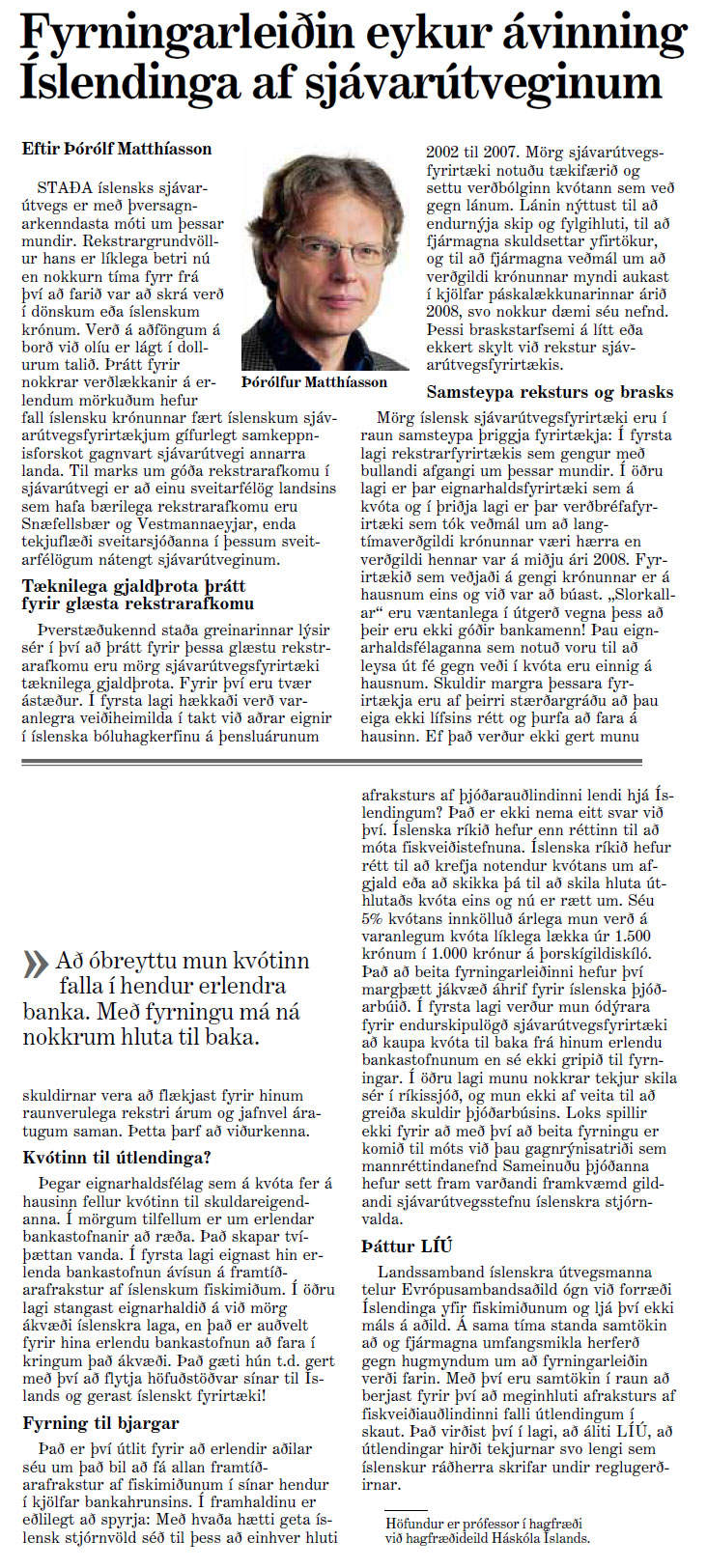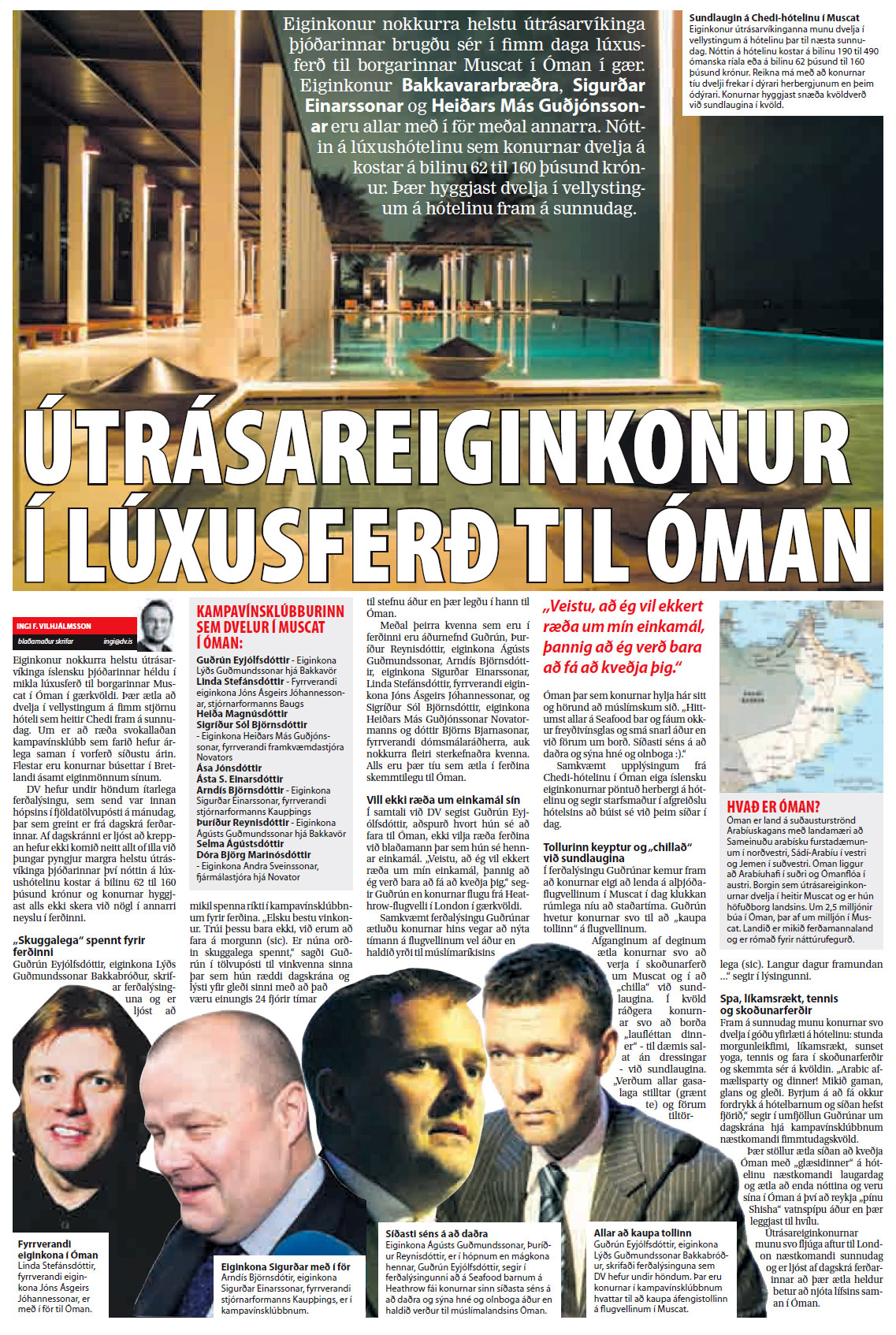Færsluflokkur: Viðskipti og fjármál
23.5.2009
Sakamálin saksóknarans
Þar kom að því að eitthvað gerðist, nærri 8 mánuðum eftir hrun. Allir hafa þeir því haft nægan tíma til að fela slóðir og eyða gögnum. Eða hvað? Eva Joly sagði reyndar að hægt væri að rekja peningaflutninga fram og aftur blindgötuna um langt skeið. Vonandi er það rétt, en þá er að fá upplýsingarnar.
Norðurlöndin gerðu nýverið samning við Bresku Jómfrúreyjar (sem Tortóla tilheyrir) um að fá upplýsingar um skúffufyrirtæki og sitthvað þvíumlíkt. En hvernig standa málin með Kaupþing í Lúx? Nóg virðist hafa farið af þýfi þar í gegn, skilst manni. Sigrún Davíðsdóttir hefur unnið ötullega að upplýsingaöflun um þessi mál - skúffufyrirtæki og leynifélög hér og hvar - og hún er líklega orðin sérfræðingur í skattaskjólinu Lúxemborg. Ég bendi á hina ómetanlegu pistla hennar í Speglinum sem lesa má og hlusta á hér. Pistlar Sigrúnar eru hafsjór af fróðleik.
En loksins, loksins er eitthvað að gerast. Sérstakur saksóknari kominn í stellingar og búinn að gera húsleit. Þetta hefði gerst fyrir löngu víða annars staðar - og menn verið hnepptir í varðhald vegna þess að rökstuddur grunur væri um að lögbrot hefði verið framið. En ringulreiðin sem tröllriðið hefur stjórnsýslunni hér er með ólíkindum. Enginn veit af hverju ekkert var aðhafst strax. Hinir brotlegu bjuggust við því og gerðu ráðstafanir eins og fram kemur m.a. í myndbandi hér. En enginn var handtekinn, engar eignir frystar - ekkert slíkt hefur gerst ennþá.
Hvort saksóknari og hans fólk fann eitthvað við húsleit og þá hvað vitum við ekki. Né heldur af hverju var byrjað akkúrat þarna. En af nógu er að taka og einhvers staðar verður að byrja. Til upprifjunar bendi ég á pistilinn Réttlæti óskast - má kosta peninga. Ég var orðin allverulega óþolinmóð fyrir 2 mánuðum, hvað þá núna.
Ég klippti saman nokkrar fréttir um Katar-Kaupþingsmálið. Fréttir af kaupum Katarfurstans birtust fyrst 22. september sl. Svo heyrðist ekkert af því máli fyrr en í janúar þegar farið var að draga þann gjörning í efa. Ólafur Ólafsson og Sigurður Einarsson mótmæltu hástöfum, gáfu út yfirlýsingar og sögðu viðskiptin ofureðlileg. Einmitt það.
Fréttir Stöðvar 2 og RÚV frá september 2008, janúar 2009 og maí 2009
Kastljós 19. janúar 2009 - Ólafur Ólafsson, Pétur Blöndal og Vilhjálmur Bjarnason
Ég hef fjallað um hinar undarlegu Nærmyndir af auðmönnum sem birtust í Íslandi í dag í ársbyrjun. Hér gat ég mér þess til að tilgangur þeirra væri að mýkja hug og hjörtu landsmanna gagnvart þeim þegar eitthvað stóð til. Hér er ein Nærmyndin í athyglisverðu samhengi. Einnig var gerð Nærmynd af Ólafi Ólafssyni. Takið eftir að hún birtist á skjánum 13. janúar, en fyrsta fréttin af meintum svikum í Katar-Kaupþingsmálinu birtist 14. janúar og fleiri næstu daga. Þetta er auðvitað afskaplega heppilegt - búið að mýkja okkur svolítið með notalegri Nærmynd rétt áður en sprengjurnar falla. Klókur leikur eða undarleg tilviljun?
Ísland í dag 13. janúar 2009 - Nærmynd af Ólafi Ólafssyni
Síðast en hreint ekki síst hengi ég við færsluna tvö Spegilbrot. Hið fyrra er frá 20. janúar og er viðtal við Vilhjálm Bjarnason um Katar-Kaupþingsmál. Hið síðara er pistill Sigrúnar Davíðsdóttur frá 30. janúar um Katar, Kaupþing, Lúx og Líbýu. Mjög fróðlegt.
Viðskipti og fjármál | Breytt 24.5.2009 kl. 21:52 | Slóð | Facebook | Athugasemdir (20)
22.5.2009
Gjaldþrot og upprisa þjóðar
Ég skrifaði þennan pistil í upphafi efnahagshrunsins, eða 4. október sl. Mundi eftir Spegilsviðtali sem hafði vakið athygli mína tæpum tveimur mánuðum áður um argentínska efnahagsundrið og síðan gjaldþrot þjóðarinnar. Ég held að það sé ekki vitlaust að rifja þetta upp og birta aftur með myndinni um efnahagshrun Argentínu sem varð fyrir ekki svo ýkja löngu síðan. Hvort sem þið lesið pistilinn eða ekki - horfið að minnsta kosti á myndina. Hún er mögnuð. Neðst í færsluna hengi ég Spegilsviðtalið sem vitnað er í í pistlinum. Hlustið á það líka.
Verða hin nýju, íslensku yfirvöld of hrokafull - eina ferðina enn - til að læra af reynslu annarra þjóða? Verður enn og aftur talað um hinar frægu "séríslensku aðstæður" og öllu klúðrað? Maður spyr sig...
Ástand efnahagsmála á Íslandi yfirskyggir alla aðra umræðu þessa dagana og ekki að ástæðulausu. Við erum skelfingu lostin og dregist hefur úr hömlu að stjórnvöld finni lausn á vandanum sem blasað hefur við alllengi. En við erum líka öskureið út í þá ofurlaunuðu, eigingjörnu gróðapunga og áhættufíkla sem hafa leikið sér með efnahag þjóðarinnar og að því er virðist teflt svo djarft að ekkert mátti út af bregða til að spilaborgin hryndi.
Þegar ástandið jafnar sig, sem það hlýtur að gera um síðir, og óttinn hjaðnar náum við vonandi þeirri sálarró að geta íhugað hverju er um að 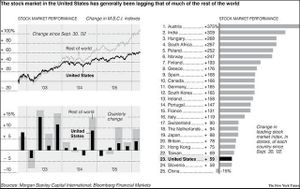 kenna, lært af reynslunni og hindrað að slíkt ástand komi upp aftur. Þar á ég við þær aðstæður sem þessum mönnum voru skapaðar til að seðja áhættufíkn sína og græðgi, skort á regluverki, aðhaldi og eftirliti með því hvernig þeir umgengust fjármuni og spiluðu með efnahag og orðstír lítillar þjóðar sem ekki má við miklu hnjaski. Ég fæ ekki betur séð en þar sé við að sakast þá stjórnmálaflokka sem sátu við völd, veittu frelsið mikla, sömdu og samþykktu lögin en hirtu ekki um að hnýta lausa enda. Og létu undan þrýstingi. Meðal annars þess vegna er svo hlægilegt að hlusta á framsóknarforkólfana Guðna, Valgerði, Siv og fleiri sem öll bera ábyrgð á ástandinu eftir langa valdasetu og helmingaskipti, en tala nú af heilagri vandlætingu eins og þeim komi málið ekki við, þau séu alsaklaus og flokkurinn hafi breyst úr maddömu í mey við það eitt að lenda í stjórnarandstöðu.
kenna, lært af reynslunni og hindrað að slíkt ástand komi upp aftur. Þar á ég við þær aðstæður sem þessum mönnum voru skapaðar til að seðja áhættufíkn sína og græðgi, skort á regluverki, aðhaldi og eftirliti með því hvernig þeir umgengust fjármuni og spiluðu með efnahag og orðstír lítillar þjóðar sem ekki má við miklu hnjaski. Ég fæ ekki betur séð en þar sé við að sakast þá stjórnmálaflokka sem sátu við völd, veittu frelsið mikla, sömdu og samþykktu lögin en hirtu ekki um að hnýta lausa enda. Og létu undan þrýstingi. Meðal annars þess vegna er svo hlægilegt að hlusta á framsóknarforkólfana Guðna, Valgerði, Siv og fleiri sem öll bera ábyrgð á ástandinu eftir langa valdasetu og helmingaskipti, en tala nú af heilagri vandlætingu eins og þeim komi málið ekki við, þau séu alsaklaus og flokkurinn hafi breyst úr maddömu í mey við það eitt að lenda í stjórnarandstöðu.
Eftirsóttustu viðmælendur fjölmiðlanna, fyrir utan ráðherra, eru nú hagfræðingar. Einn segir eitt og sá næsti eitthvað allt annað. Sumir eru bjartsýnir, aðrir svartsýnir. Þeir láta sér um munn fara alls konar orð og hugtök sem enginn skilur nema kollegarnir og kannski þeir sem vinna í fjármálabransanum. Greiningardeildir bankanna, sem nú ku allir standa tæpt, hafa undanfarna daga, vikur og mánuði rutt út úr sér alls konar hagspám og þær eru með sérheimasíður hjá öllum fjármálastofnunum. Bunan stendur út úr talsmönnum þeirra um skortstöður, hagtölur og línurit og þeir spá hinu og þessu næstu vikur og mánuði. Rýnt er í tölur og gröf en það sem gleymist gjarnan er fólkið sem er á bak við tölurnar eða sem tölurnar vísa í, fjárhagur þess, heimili, heill, velferð, viðhorf og hamingja. Tölur eru blóðlausar og skortir alla mennsku og hlýju. Þær taka ekki tillit til raunveruleikans sem maður lifir í og sýna eitthvað allt annað. Enda þótt hagfræði og tölur séu nauðsynleg tæki til vissra hluta eru þau ekki veruleikinn sjálfur og geta ekki náð utan um allar hliðar hans.
Um miðjan ágúst sl. var að venju athyglisverð umfjöllun í Speglinum á RÚV. Þar var tilefnið gjaldþrot argentínsku þjóðarinnar ekki alls fyrir löngu. Látum Spegilsmenn hafa orðið: "Það var einu sinni talað um argentínska efnahagsundrið en svo varð argentínska ríkið gjaldþrota. Er nokkuð sameiginlegt með Argentínu og Íslandi og hvað segja hagtölur okkur? Við ræðum við Hólmfríði Garðarsdóttur, lektor.
Þar var tilefnið gjaldþrot argentínsku þjóðarinnar ekki alls fyrir löngu. Látum Spegilsmenn hafa orðið: "Það var einu sinni talað um argentínska efnahagsundrið en svo varð argentínska ríkið gjaldþrota. Er nokkuð sameiginlegt með Argentínu og Íslandi og hvað segja hagtölur okkur? Við ræðum við Hólmfríði Garðarsdóttur, lektor.
Á tíunda áratugnum voru stofnanir í Argentínu einkavæddar í stórum stíl. Það var meðal annars fyrir tilstilli Alþjóðabankans og Alþjóðagjaldeyrissjóðsins. Hagtölur voru svo jákvæðar að talað var um "argentínska efnahagsundrið". En svo varð landið gjaldþrota árið 2001 og nú huga stjórnvöld að því að ná aftur til ríkisins flugfélögum sem voru seld alþjóðlegu fyrirtæki. Hefðu Íslendingar átt að læra meira af þeirra reynslu? Hólmfríður Garðarsdóttir, lektor við Háskóla Íslands, þekkir vel til stjórnmála í Argentínu. Hún spyr í ljósi þess sem þar gerðist hversu raunhæf mælieining hagfræðin sé og hvaða merkingu tölur hennar hafa. Er hún raunveruleg speglun samfélagsins eða er þörf á því að skoða það með fjölbreyttari aðferðum."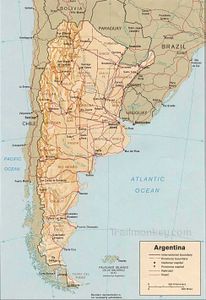 Þetta var bara byrjunin á umfjöllun Spegilsins, sem var afskaplega athyglisverð. Hólmfríður segir m.a. um það sem gerðist í kjölfar gjaldþrotsins að Argentínumenn hafi orðið mjög ákveðnir í að bjarga sér sjálfir eftir kaosástandið sem varði í um tvö ár. "Við höfum eitthvað annað til að bera heldur en það sem einhverjir aðrir ætlast til af okkur," sögðu þeir. Argentínumenn öðluðust sjálfsöryggi til að reiða sig á sjálfa sig í kjölfar niðurbrotsins. Þeir hættu að leita að módelum fyrir velgengni og velferð annars staðar og studdust frekar við það sem hentaði þeim við þær aðstæður sem þar ríktu. Þetta var ekki átakalaust og Argentína fór í gegnum hræðilegar hremmingar, náði upprisu en nú eru aftur komnar alvarlegar krísur sem snúast aðallega um atvinnuleysi.
Þetta var bara byrjunin á umfjöllun Spegilsins, sem var afskaplega athyglisverð. Hólmfríður segir m.a. um það sem gerðist í kjölfar gjaldþrotsins að Argentínumenn hafi orðið mjög ákveðnir í að bjarga sér sjálfir eftir kaosástandið sem varði í um tvö ár. "Við höfum eitthvað annað til að bera heldur en það sem einhverjir aðrir ætlast til af okkur," sögðu þeir. Argentínumenn öðluðust sjálfsöryggi til að reiða sig á sjálfa sig í kjölfar niðurbrotsins. Þeir hættu að leita að módelum fyrir velgengni og velferð annars staðar og studdust frekar við það sem hentaði þeim við þær aðstæður sem þar ríktu. Þetta var ekki átakalaust og Argentína fór í gegnum hræðilegar hremmingar, náði upprisu en nú eru aftur komnar alvarlegar krísur sem snúast aðallega um atvinnuleysi.
Einkavæðingarferlið í Argentínu er að ganga til baka. Það gekk allt út á hagfræði en tók ekki tillit til annarra hliða á mannlífinu eins og kemur fram í viðtalinu við Hólmfríði. Í ljós kemur að hagtölur hafa enga merkingu fyrir almenning sem lifir í landinu. Hólmfríður segir: "Þú ert annaðhvort bóndi í norðurhluta landsins, suðurhluta þess, eða íbúi í borg. Það er búið að loka bankaútibúinu í þorpinu þínu, búið að loka búðinni, gjaldmiðillinn þinn hefur ekkert vægi, ekkert gildi, enga merkingu... þá skipta hagtölur engu máli." Íbúar hugsa um það eitt að lifa frá degi til dags.
Kannast einhver við þessa lýsingu?
Hólmfríður heldur áfram: "Ég hef svolítið verið að bera þetta saman við það sem hefur verið að gerast á Íslandi og upplýsingarnar sem komu fram í febrúar á þessu ári þar sem við vorum ennþá - okkar fjármálaspekúlantar voru ennþá að segja okkur að þetta væri allt í lagi. Hér væri allt á byljandi blússi og við værum í fínum gír. Svo kemur bara apríl, maí og júní og það er einhver allt annar veruleiki sem blasir við okkur. Hann er að byrja að hafa áhrif á Íslendinga. Þá einhvern veginn blasir kaldhæðnin í hagtölunum við." Virðing almennings fyrir þeim sem réðu og voru kjörnir til að hafa áhrif og fara með völd og peninga hrundi og ekki hvað síst virðing fyrir hagspekingum og fjármálaspekúlöntum.
Efnahagsundrið í Argentínu stóð yfir frá um 1990 til 2000, það er ekki lengra síðan.
Hólmfríður spyr að lokum: "Hversu raunhæf mælieining er hagfræðin? Hvaða merkingu hafa tölurnar? Er það einhver speglun á samfélagið? Eru bókmenntir ekki miklu betri spegill, þar sem lýst er raunverulegum aðstæðum fólks, viðhorfum, sjónarmiðum, vangaveltum og efasemdum, heldur en hagtölur?" Er það ekki? Ég held það.
Efnahagshrun Argentínu - 1. hluti
Efnahagshrun Argentínu - 2. hluti
Efnahagshrun Argentínu - 3. hluti
17.5.2009
Kolbrún og smásálirnar
Sú var tíðin að Kolbrúnu Bergþórsdóttur tókst hvað eftir annað að koma mér á óvart í pistlum sínum. Það var einkum mannfyrirlitning hennar sem mér fannst undarleg, sem og sýn hennar á íslensku þjóðarsálina. En ei meir, ei meir. Ég hef líklega metið Kolbrúnu rangt - á einn eða annan hátt. Svona hljóðar pistill hennar í Mogga dagsins. Nú er þjóðarsál í kreppu orðin smásál dauðans að hennar mati. Æ, æ, Kolla...
Svona skrifaði Kolbrún í desember.
Og hér ver Kolbrún ofurlaunin - réttlætir þau m.a. með ábyrgð. Hvaða ábyrgð?
Fleiri pistla Kolbrúnar má sjá hér. Ég uppfæri öðru hvoru.
16.5.2009
Sofandi að feigðarósi - aftur?
Bók Ólafs Arnarsonar, Sofandi að feigðarósi, hefur verið mjög umtöluð síðan hún kom út fyrir nokkrum vikum. Í gær hitti ég konu sem hefur lesið hana og hún sagði að undiraldan í bókinni - það sem látið er ósagt en lesa megi á milli línanna - væri ekki síður áhugavert en sjálfur texti bókarinnar.
Ólafur var gestur í Silfri Egils 26. apríl sl.
Ólafur skrifaði vægast sagt athyglisverða grein í Pressuna sl. fimmtudag og var auk þess gestur Björns Inga Hrafnssonar í Markaðnum á Stöð 2 sama kvöld. Hann fylgdi greininni eftir með þessu ákalli í gær - Í guðs bænum opnið augun!
Markaðurinn með Birni Inga 14. maí sl.
Í kjölfarið skrifaði Jón Baldvin Hannibalsson opið bréf til viðskiptaráðherra í gær sem ráðherrann svarar á sama vettvangi í dag og útilokar ekki skuldaafskriftir. Öll þessi umræða fer fram á Pressunni.
Mér virðist almenningur búinn að skipta um gír og vera hálfdottandi á verðinum. Eftir hamfarir vetrarins er eins og margir hafi lagst í dvala. Þetta gerðist fyrst eftir að minnihlutastjórnin tók við í byrjun febrúar. Þá var eins og mörgum hafi fundist málin leyst, þeir hættu að mæta á mótmæla- og borgarafundi og vísir að fyrra sinnuleysi fannst greinilega. Mánuðinn fyrir kosningar komst lítið annað að en undarlegur, flokkspólitískur skotgrafahernaður og hann hefur haldið áfram eftir kosningar.
Furðuleg, einskis verð mál eins og eignarhald þingflokksherbergja, sykurskattur, hneykslan yfir að nokkrir þingmenn hafi ekki mætt í messu fyrir þingsetningu og fleira í þeim dúr hafa keyrt ýmsa mikilvægari umræðu í kaf. Svo virðist sem Sjálfstæðis- og Framsóknarflokkur ætli að vera á móti góðum málum á þingi - bara af því þeir eru í stjórnarandstöðu og "hefðin" kveður á um að þá eigi þeir að vera á móti málum stjórnarflokkanna. Þetta er auðvitað algjört rugl. En Borgarahreyfingin virðist ekki ætla að detta í þennan fúla pytt flokkspólitísks skotgrafahernaðar á kostnað þjóðarinnar. Vonandi sjá hinir flokkarnir að sér og styðja góð mál stjórnarinnar. Og öfugt. Stjórnarflokkarnir verða líka að átta sig á því, að ekki er allt alslæmt sem frá stjórnarandstöðuflokkunum kemur og gefa málum þeirra tækifæri - ef þau eru þess virði.
Pólitískar eða persónulegar flokkaerjur, svo ekki sé minnst á siðlausa og gjörspillta hagsmunagæslu örfárra auðmannahópa í samfélaginu er allsendis óviðeigandi eins og ástandið í íslensku þjóðfélagi er um þessar mundir. Við verðum ÖLL að gera þá kröfu til ráðherra og alþingismanna að þeir láti hagsmuni almennings ganga fyrir - alltaf, í öllum málum. Enn og aftur bendi ég á þennan Krossgötuþátt og hvet alla til að hlusta. Ég mæli líka með að fólk rifji upp þennan pistil, horfi og hlusti á viðtölin við Vilhjálm Árnason, heimspeking og prófessor, þar sem hann segir stjórnmálin líða fyrir valdhroka.
Og fjölmiðlarnir verða að standa vaktina. Fréttamenn verða að vera þeir hliðverðir lýðræðisins sem Óðinn Jónsson, fréttastjóri RÚV, segir þá vera í þessum pistli sínum. Þetta Lykla-Péturshlutverk frétta- og blaðamanna er með mikilvægustu hlutverkum í því þjóðfélagslega leikriti lífsins sem leikið er af íslensku þjóðinni um þessar mundir og þeir mega ekki klikka. Ábyrgð þeirra er slík að frammistaðan getur skipt sköpum fyrir framtíð þjóðarinnar. Við megum ekki fljóta sofandi að feigðarósi - aftur!
Viðskipti og fjármál | Breytt s.d. kl. 14:55 | Slóð | Facebook | Athugasemdir (7)
15.5.2009
Ógleymanlegt bréf til Egils
Eins og þeir vita sem lesa blogg Egils Helgasonar reglulega birtir hann oft bréf sem hann fær. Stundum nafnlaus, stundum fylgja nöfn bréfritara. Þau eru misjöfn, þessi bréf. Sum eru stútfull af upplýsingum, góðum pælingum og öllum mögulegum fróðleik. Önnur lýsa persónulegum upplifunum fólks og snerta mann á annan hátt. Öll skipta þau máli í umræðunni og Egill velur þau yfirleitt af kostgæfni, að því er virðist.
Á hádegi í gær birti Egill nokkur bréf. Eitt þeirra hefur verið að velkjast í huga mér síðan og ég losna ekki við það úr huganum. Ég er búin að lesa bréfið þrjátíu sinnum og það er með ólíkindum. Bréfið vekur upp í mér gríðarlega reiði, nístandi sárindi, óskaplega skömm og djúpa sorg. Ég hef þráspurt sjálfa mig síðan ég las það hvers konar samfélag hefur fóstrað svona fólk. Hvort þeir séu margir sem hugsa svona. Hvernig hægt sé að vera svona þenkjandi í þessu litla samfélagi okkar. Svona eigingjarn og sérgóður á meðan þjóðinni blæðir út. Hvers konar siðferði hefur mótað slíka sérhagsmunagæslumenn sem gefa skít í allt og alla nema sjálfa sig?
Bréfið segir mikla og stóra sögu í látleysi sínu. Takið eftir eignarhaldi jöklabréfanna. (Vill einhver fjölmiðill vinsamlegast komast að eignarhaldi þeirra!) Ég skil mætavel niðurstöðu og ákvörðun bréfritara. Spurning hvort maður fetar í fótspor hans. Svona hljóðar bréfið:
"Ég var í samkvæmi um helgina. Þar var maður sem sagðist eiga nokkur hundruð milljónir í jöklabréfum skráð á félag á Tortóla. Hann sagðist ekki sjá ástæðu til þess að gefa tommu eftir, hann hefði jú fjárfest í góðri trú. Stuttu seinna fóru umræðurnar að snúast um afturköllun aflaheimilda. Útgerðarmaður í hópnum hló að þessar ríkisstjórn og sagði að þeir myndu fljótlega ganga á vegg með þetta. Þarna töluðu allir digurbarkalega um að verja rétt sinn og aflandseyjar.
Í dag opnaði ég netbankann minn. Teygjulánið var komið inn (skipti um íbúð rétt fyrir hrun og náði ekki að selja hina). Það sem á að bætast aftan við lánið er sett í reitinn VANSKIL. Mér sortnaði fyrir augum, það hvarf hjá mér öll löngun til að hjálpa þessu landi. Ég hafði jú fengið erlent lán hjá bankanum, en nokkrum vikum seinna hringdi sami bankinn og bað mig um að setja allan sparnaðinn í sjóð 9 því að það væri svo pottþétt.
Ég hef vel undan að borga en löngunin er horfin. Ég hringdi í lögfræðing og ætla að skipuleggja þrot mitt fram í tímann."
14.5.2009
Það ku vera gott að búa í Kópavogi
Enda vita Kópavogsbúar alltaf hvernig útsvarinu þeirra er varið.
14.5.2009
Athyglisverð umræða
Hér eru tveir menn heldur betur á öndverðum meiði. Ég veit ekki hvers vegna (jújú, ég veit það alveg), en ég trúi ekki einu orði sem frá kvótakóngunum og LÍÚ-grátkórnum kemur. Frá því ég man eftir mér hafa útgerðarmenn vælt og volað endalaust. En ég get ekki með nokkru móti séð að þeir hafi það skítt. Ekki bera þyrlukaup, bílafloti, laxveiðar og aðrir lifnaðarhættir það með sér. Hefur einhver spáð t.d. í "eignasafn" Samherjamanna? Eða er þetta kannski allt út á krít eins og hjá útrásarauðmönnum - og við sitjum uppi með skuldir þeirra ef illa fer? Kvótinn ku jú vera veðsettur fyrir hundruði milljarða mörg ár fram í tímann - vegna græðgi kvótakónganna. Þetta verður að stöðva.
Viðskipti og fjármál | Breytt s.d. kl. 10:21 | Slóð | Facebook | Athugasemdir (7)
13.5.2009
Lúxusferð í boði íslensku þjóðarinnar
Við erum nú góðir í okkur og umburðarlyndir, Íslendingar. Er það ekki? Hópur manna rændi okkur aleigunni og kom þjóðfélaginu á heljarþröm og þeir ganga allir lausir. Voru búnir að koma eigum sínum og mestum fjármunum undan fyrir hrun og hafa síðan fengið að dunda sér við að redda restinni undanfarna rúma sjö mánuði. Við berum svo mikla virðingu fyrir mannréttindum þeirra að það má ekki frysta eða sækja þýfið. Ekki fyrr en kannski mögulega eftir áralöng réttarhöld, þegar og ef tekst að sakfella einhvern.
Á meðan blæðir samfélaginu út. Börn fá ekki að borða, dregið er úr kennslu í skólum, öll þjónusta er skert alls staðar, þjóðin rambar á barmi uppgjafar og fólk glatar aleigunni. En það hindrar nú ekki eiginkonur útrásarauðmannanna í að skemmta sér og fara í lúxusferðir fyrir þýfið - peningana sem ættu með réttu að vera með lögheimili á Íslandi og nýtast íslenskum almenningi. Ekki notast í óhóf og munað í eðalvillum í útlöndum og rándýrum skemmtiferðum. Og þetta er svo mikið einkamál að það er ekki einu sinni til umræðu.
Já, við erum höfðingjar, Íslendingar... en suma virðist skorta allt jarðsamband, heilbrigða skynsemi og almennt siðferði. Og þeir kunna ekki að skammast sín, svo mikið er víst. Smellið þar til læsileg stærð fæst.
10.5.2009
Silfur dagsins
Enn eitt frábært Silfur að baki og enn einu sinni fékk Egill erlenda sérfræðinga í þáttinn til sín. Þeir eru nú orðnir allmargir sem hafa verið í Silfrinu með þann ótvíræða kost í farteskinu að horfa á ástandið á Íslandi utanfrá, flestir sem hlutlausir sérfræðingar með skoðanir. En stóra spurningin er hvort yfirvöld á Íslandi hafa hlustað á sérþekkingu þessa fólks, hvort sem það hefur talað í Silfrinu, Kastljósi eða annars staðar?
Jú... Eva Joly var ráðin til aðstoðar við rannsókn á bankahruninu og Anne Sibert er í peningastefnunefnd Seðlabankans. En hvað með t.d. Robert Wade og Willem Buiter? Eða Michael Hudson og John Perkins... tóku yfirvöld eftir þeim? Er einhver að skoða það sem þetta fólk hafði til málanna að leggja?
Í dag voru tveir afar ólíkir útlendingar hjá Agli, þau Ann Pettifor og William K. Black. Egill segir um Ann á vefsíðu sinni: "Ann Pettifor er forstjóri samtaka sem nefnast Advocacy International. Hún var aðalhvatamaður átaks sem hét Jubilee 2000 - þar var barist fyrir því að skuldir fátækustu ríkja heims yrðu felldar niður. Pettifor spáði því að efnahagskerfi heimsins stefndi í hrun vegna skulda þegar árið 2003, en 2006 gaf hún út bókina The Coming First World Debt Crises."
Um Black segir Egill: "Black er háskólaprófessor sem áður var háttsettur í fjármálaeftirliti. Hann hefur fjallað mikið um fjársvik og hlut þeirra í efnahagshruninu, mun flytja fyrirlestur um þetta efni í Háskólanum klukkan 12 á morgun. Fyrirlesturinn heitir 'Why Economists Must Embrace the "F" Word (Fraud)'. Black er höfundur bókar sem nefnist The Best Way to Rob a Bank is from the Inside." Í færslunni hér á undan má sjá (og lesa) rúmlega mánaðargamalt viðtal við Black á bandarískri sjónvarpsstöð.
Páll Vilhjálmsson var varla búinn að opna munninn í öðrum hluta Vettvangs dagsins þegar síminn hringdi hjá mér. Í símanum var vinkona mín, alveg ævareið. Hún sagði Pál vera beinlínis að ljúga þegar hann sagði að samþykkt VG á aðildarviðræðum væru bein svik við kjósendur þeirra og að enginn fyrirvari hafi verið um að VG myndu breyta mati sínu á að Íslandi væri betur borgið utan ESB. Vinkona mín og maðurinn hennar höfðu einmitt velt mikið fyrir sér hvort þau ættu að kjósa VG eða Samfylkingu. Hjörtu þeirra slógu nær VG en þau vildu aðildarviðræður. Og einmitt vegna þess að VG höfðu sagt að ef farið væri í viðræður (höfðu það opið) yrði samningur síðan lagður í dóm þjóðarinnar - þá kusu þau bæði VG. Þeim fannst Páll harla ómerkilegur í sínum málflutningi. Enda eru ekki nema 4 dagar síðan birt var skoðanakönnun um fylgi við aðildarviðræður annars vegar og aðild hins vegar og þar kom greinilega fram að meirihluti kjósenda VG vill fara í aðildarviðræður - og síðan væntanlega þjóðaratkvæðagreiðslu um samninginn - eins og sjá má hér: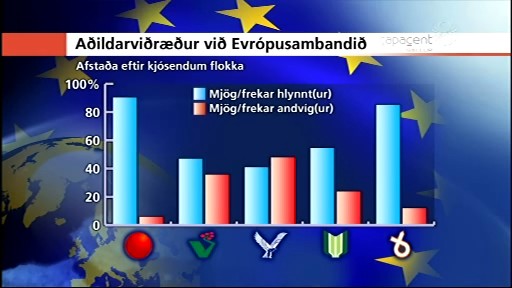
En lítum á Silfrið. Vettvangurinn var fjölmennur og þau Ann Pettifor og William K. Black stórfín og málefnaleg.
Vettvangur dagsins 1 - Ólafur, Hallur, Margrét og Andrés
Vettvangur dagsins 2 - Páll og Auðunn
Ann Pettifor - með íslenskum texta
William K. Black - með íslenskum texta
Viðskipti og fjármál | Breytt 11.5.2009 kl. 11:00 | Slóð | Facebook | Athugasemdir (4)
10.5.2009
"Besta leiðin til að ræna banka...
...er að eiga hann," sagði William K. Black sem er gestur í Silfrinu í dag. Þetta var reyndar titill á bók sem hann skrifaði og það verður spennandi að heyra hvað hann segir um íslensku bankaræningjana.
Hér er útskrift af spjalli Bills Moyers og Williams Black:
3. apríl 2009
BILL MOYERS: Welcome to the Journal.
For months now, revelations of the wholesale greed and blatant transgressions of Wall Street have reminded us that "The Best Way to Rob a Bank Is to Own One." In fact, the man you're about to meet wrote a book with just that title. It was based upon his experience as a tough regulator during one of the darkest chapters in our financial history: the savings and loan scandal in the late 1980s.
WILLIAM K. BLACK: These numbers as large as they are, vastly understate the problem of fraud.
MOYERS: Bill Black was in New York this week for a conference at the John Jay College of Criminal Justice where scholars and journalists gathered to ask the question, "How do they get away with it?" Well, no one has asked that question more often than Bill Black.
The former Director of the Institute for Fraud Prevention now teaches Economics and Law at the University of Missouri, Kansas City. During the savings and loan crisis, it was Black who accused then-house speaker Jim Wright and five US Senators, including John Glenn and John McCain, of doing favors for the S&L's in exchange for contributions and other perks. The senators got off with a slap on the wrist, but so enraged was one of those bankers, Charles Keating - after whom the senate's so-called "Keating Five" were named - he sent a memo that read, in part, "get Black - kill him dead." Metaphorically, of course. Of course.
Now Black is focused on an even greater scandal, and he spares no one - not even the President he worked hard to elect, Barack Obama. But his main targets are the Wall Street barons, heirs of an earlier generation whose scandalous rip-offs of wealth back in the 1930s earned them comparison to Al Capone and the mob, and the nickname "banksters."
Bill Black, welcome to the Journal.
BLACK: Thank you.
MOYERS: I was taken with your candor at the conference here in New York to hear you say that this crisis we're going through, this economic and financial meltdown is driven by fraud. What's your definition of fraud?
BLACK: Fraud is deceit. And the essence of fraud is, "I create trust in you, and then I betray that trust, and get you to give me something of value." And as a result, there's no more effective acid against trust than fraud, especially fraud by top elites, and that's what we have.
MOYERS: In your book, you make it clear that calculated dishonesty by people in charge is at the heart of most large corporate failures and scandals, including, of course, the S&L, but is that true? Is that what you're saying here, that it was in the boardrooms and the CEO offices where this fraud began?
BLACK: Absolutely.
MOYERS: How did they do it? What do you mean?
BLACK: Well, the way that you do it is to make really bad loans, because they pay better. Then you grow extremely rapidly, in other words, you're a Ponzi-like scheme. And the third thing you do is we call it leverage. That just means borrowing a lot of money, and the combination creates a situation where you have guaranteed record profits in the early years. That makes you rich, through the bonuses that modern executive compensation has produced. It also makes it inevitable that there's going to be a disaster down the road.
MOYERS: So you're suggesting, saying that CEOs of some of these banks and mortgage firms in order to increase their own personal income, deliberately set out to make bad loans?
BLACK: Yes.
MOYERS: How do they get away with it? I mean, what about their own checks and balances in the company? What about their accounting divisions?
BLACK: All of those checks and balances report to the CEO, so if the CEO goes bad, all of the checks and balances are easily overcome. And the art form is not simply to defeat those internal controls, but to suborn them, to turn them into your greatest allies. And the bonus programs are exactly how you do that.
MOYERS: If I wanted to go looking for the parties to this, with a good bird dog, where would you send me?
BLACK: Well, that's exactly what hasn't happened. We haven't looked, all right? The Bush Administration essentially got rid of regulation, so if nobody was looking, you were able to do this with impunity and that's exactly what happened. Where would you look? You'd look at the specialty lenders. The lenders that did almost all of their work in the sub-prime and what's called Alt-A, liars' loans.
MOYERS: Yeah. Liars' loans--
BLACK: Liars' loans.
MOYERS: Why did they call them liars' loans?
BLACK: Because they were liars' loans.
MOYERS: And they knew it?
BLACK: They knew it. They knew that they were frauds.
BLACK: Liars' loans mean that we don't check. You tell us what your income is. You tell us what your job is. You tell us what your assets are, and we agree to believe you. We won't check on any of those things. And by the way, you get a better deal if you inflate your income and your job history and your assets.
MOYERS: You think they really said that to borrowers?
BLACK: We know that they said that to borrowers. In fact, they were also called, in the trade, ninja loans.
MOYERS: Ninja?
BLACK: Yeah, because no income verification, no job verification, no asset verification.
MOYERS: You're talking about significant American companies.
BLACK: Huge! One company produced as many losses as the entire Savings and Loan debacle.
MOYERS: Which company?
BLACK: IndyMac specialized in making liars' loans. In 2006 alone, it sold $80 billion dollars of liars' loans to other companies. $80 billion.
MOYERS: And was this happening exclusively in this sub-prime mortgage business?
BLACK: No, and that's a big part of the story as well. Even prime loans began to have non-verification. Even Ronald Reagan, you know, said, "Trust, but verify." They just gutted the verification process. We know that will produce enormous fraud, under economic theory, criminology theory, and two thousand years of life experience.
MOYERS: Is it possible that these complex instruments were deliberately created so swindlers could exploit them?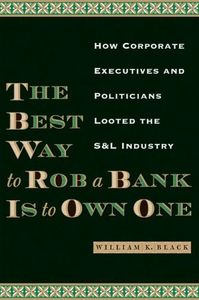 BLACK: Oh, absolutely. This stuff, the exotic stuff that you're talking about was created out of things like liars' loans, that were known to be extraordinarily bad. And now it was getting triple-A ratings. Now a triple-A rating is supposed to mean there is zero credit risk. So you take something that not only has significant, it has crushing risk. That's why it's toxic. And you create this fiction that it has zero risk. That itself, of course, is a fraudulent exercise. And again, there was nobody looking, during the Bush years. So finally, only a year ago, we started to have a Congressional investigation of some of these rating agencies, and it's scandalous what came out. What we know now is that the rating agencies never looked at a single loan file. When they finally did look, after the markets had completely collapsed, they found, and I'm quoting Fitch, the smallest of the rating agencies, "the results were disconcerting, in that there was the appearance of fraud in nearly every file we examined."
BLACK: Oh, absolutely. This stuff, the exotic stuff that you're talking about was created out of things like liars' loans, that were known to be extraordinarily bad. And now it was getting triple-A ratings. Now a triple-A rating is supposed to mean there is zero credit risk. So you take something that not only has significant, it has crushing risk. That's why it's toxic. And you create this fiction that it has zero risk. That itself, of course, is a fraudulent exercise. And again, there was nobody looking, during the Bush years. So finally, only a year ago, we started to have a Congressional investigation of some of these rating agencies, and it's scandalous what came out. What we know now is that the rating agencies never looked at a single loan file. When they finally did look, after the markets had completely collapsed, they found, and I'm quoting Fitch, the smallest of the rating agencies, "the results were disconcerting, in that there was the appearance of fraud in nearly every file we examined."
MOYERS: So if your assumption is correct, your evidence is sound, the bank, the lending company, created a fraud. And the ratings agency that is supposed to test the value of these assets knowingly entered into the fraud. Both parties are committing fraud by intention.
BLACK: Right, and the investment banker that - we call it pooling - puts together these bad mortgages, these liars' loans, and creates the toxic waste of these derivatives. All of them do that. And then they sell it to the world and the world just thinks because it has a triple-A rating it must actually be safe. Well, instead, there are 60 and 80 percent losses on these things, because of course they, in reality, are toxic waste.
MOYERS: You're describing what Bernie Madoff did to a limited number of people. But you're saying it's systemic, a systemic Ponzi scheme.
BLACK: Oh, Bernie was a piker. He doesn't even get into the front ranks of a Ponzi scheme...
MOYERS: But you're saying our system became a Ponzi scheme.
BLACK: Our system...
MOYERS: Our financial system...
BLACK: Became a Ponzi scheme. Everybody was buying a pig in the poke. But they were buying a pig in the poke with a pretty pink ribbon, and the pink ribbon said, "Triple-A."
MOYERS: Is there a law against liars' loans?
BLACK: Not directly, but there, of course, many laws against fraud, and liars' loans are fraudulent.
MOYERS: Because...
BLACK: Because they're not going to be repaid and because they had false representations. They involve deceit, which is the essence of fraud.
MOYERS: Why is it so hard to prosecute? Why hasn't anyone been brought to justice over this?
BLACK: Because they didn't even begin to investigate the major lenders until the market had actually collapsed, which is completely contrary to what we did successfully in the Savings and Loan crisis, right? Even while the institutions were reporting they were the most profitable savings and loan in America, we knew they were frauds. And we were moving to close them down. Here, the Justice Department, even though it very appropriately warned, in 2004, that there was an epidemic...
MOYERS: Who did?
BLACK: The FBI publicly warned, in September 2004 that there was an epidemic of mortgage fraud, that if it was allowed to continue it would produce a crisis at least as large as the Savings and Loan debacle. And that they were going to make sure that they didn't let that happen. So what goes wrong? After 9/11, the attacks, the Justice Department transfers 500 white-collar specialists in the FBI to national terrorism. Well, we can all understand that. But then, the Bush administration refused to replace the missing 500 agents. So even today, again, as you say, this crisis is 1000 times worse, perhaps, certainly 100 times worse, than the Savings and Loan crisis. There are one-fifth as many FBI agents as worked the Savings and Loan crisis.
MOYERS: You talk about the Bush administration. Of course, there's that famous photograph of some of the regulators in 2003, who come to a press conference with a chainsaw suggesting that they're going to slash, cut business loose from regulation, right?
BLACK: Well, they succeeded. And in that picture, by the way, the other - three of the other guys with pruning shears are the...
MOYERS: That's right.
BLACK: They're the trade representatives. They're the lobbyists for the bankers. And everybody's grinning. The government's working together with the industry to destroy regulation. Well, we now know what happens when you destroy regulation. You get the biggest financial calamity of anybody under the age of 80.
MOYERS: But I can point you to statements by Larry Summers, who was then Bill Clinton's Secretary of the Treasury, or the other Clinton Secretary of the Treasury, Rubin. I can point you to suspects in both parties, right?
BLACK: There were two really big things, under the Clinton administration. One, they got rid of the law that came out of the real-world disasters of the Great Depression. We learned a lot of things in the Great Depression. And one is we had to separate what's called commercial banking from investment banking. That's the Glass-Steagall law. But we thought we were much smarter, supposedly. So we got rid of that law, and that was bipartisan. And the other thing is we passed a law, because there was a very good regulator, Brooksley Born, that everybody should know about and probably doesn't. She tried to do the right thing to regulate one of these exotic derivatives that you're talking about. We call them C.D.F.S. And Summers, Rubin, and Phil Gramm came together to say not only will we block this particular regulation. We will pass a law that says you can't regulate. And it's this type of derivative that is most involved in the AIG scandal. AIG all by itself, cost the same as the entire Savings and Loan debacle.
MOYERS: What did AIG contribute? What did they do wrong?
BLACK: They made bad loans. Their type of loan was to sell a guarantee, right? And they charged a lot of fees up front. So, they booked a lot of income. Paid enormous bonuses. The bonuses we're thinking about now, they're much smaller than these bonuses that were also the product of accounting fraud. And they got very, very rich. But, of course, then they had guaranteed this toxic waste. These liars' loans. Well, we've just gone through why those toxic waste, those liars' loans, are going to have enormous losses. And so, you have to pay the guarantee on those enormous losses. And you go bankrupt. Except that you don't in the modern world, because you've come to the United States, and the taxpayers play the fool. Under Secretary Geithner and under Secretary Paulson before him... we took $5 billion dollars, for example, in U.S. taxpayer money. And sent it to a huge Swiss Bank called UBS. At the same time that that bank was defrauding the taxpayers of America. And we were bringing a criminal case against them. We eventually get them to pay a $780 million fine, but wait, we gave them $5 billion. So, the taxpayers of America paid the fine of a Swiss Bank. And why are we bailing out somebody who that is defrauding us?
MOYERS: And why...
BLACK: How mad is this?
MOYERS: What is your explanation for why the bankers who created this mess are still calling the shots?
BLACK: Well, that, especially after what's just happened at G.M., that's... it's scandalous.
MOYERS: Why are they firing the president of G.M. and not firing the head of all these banks that are involved?
BLACK: There are two reasons. One, they're much closer to the bankers. These are people from the banking industry. And they have a lot more sympathy. In fact, they're outright hostile to autoworkers, as you can see. They want to bash all of their contracts. But when they get to banking, they say, ‘contracts, sacred.' But the other element of your question is we don't want to change the bankers, because if we do, if we put honest people in, who didn't cause the problem, their first job would be to find the scope of the problem. And that would destroy the cover up.
MOYERS: The cover up?
BLACK: Sure. The cover up.
MOYERS: That's a serious charge.
BLACK: Of course.
MOYERS: Who's covering up?
BLACK: Geithner is charging, is covering up. Just like Paulson did before him. Geithner is publicly saying that it's going to take $2 trillion - a trillion is a thousand billion - $2 trillion taxpayer dollars to deal with this problem. But they're allowing all the banks to report that they're not only solvent, but fully capitalized. Both statements can't be true. It can't be that they need $2 trillion, because they have masses losses, and that they're fine.
These are all people who have failed. Paulson failed, Geithner failed. They were all promoted because they failed, not because...
MOYERS: What do you mean?
BLACK: Well, Geithner has, was one of our nation's top regulators, during the entire subprime scandal, that I just described. He took absolutely no effective action. He gave no warning. He did nothing in response to the FBI warning that there was an epidemic of fraud. All this pig in the poke stuff happened under him. So, in his phrase about legacy assets. Well he's a failed legacy regulator.
MOYERS: But he denies that he was a regulator. Let me show you some of his testimony before Congress. Take a look at this.
TIMOTHY GEITHNER:I've never been a regulator, for better or worse. And I think you're right to say that we have to be very skeptical that regulation can solve all of these problems. We have parts of our system that are overwhelmed by regulation.
Overwhelmed by regulation! It wasn't the absence of regulation that was the problem, it was despite the presence of regulation you've got huge risks that build up.
BLACK: Well, he may be right that he never regulated, but his job was to regulate. That was his mission statement.
MOYERS: As?
BLACK: As president of the Federal Reserve Bank of New York, which is responsible for regulating most of the largest bank holding companies in America. And he's completely wrong that we had too much regulation in some of these areas. I mean, he gives no details, obviously. But that's just plain wrong.
MOYERS: How is this happening? I mean why is it happening?
BLACK: Until you get the facts, it's harder to blow all this up. And, of course, the entire strategy is to keep people from getting the facts.
MOYERS: What facts?
BLACK: The facts about how bad the condition of the banks is. So, as long as I keep the old CEO who caused the problems, is he going to go vigorously around finding the problems? Finding the frauds?
MOYERS: You--
BLACK: Taking away people's bonuses?
MOYERS: To hear you say this is unusual because you supported Barack Obama, during the campaign. But you're seeming disillusioned now.
BLACK: Well, certainly in the financial sphere, I am. I think, first, the policies are substantively bad. Second, I think they completely lack integrity. Third, they violate the rule of law. This is being done just like Secretary Paulson did it. In violation of the law. We adopted a law after the Savings and Loan crisis, called the Prompt Corrective Action Law. And it requires them to close these institutions. And they're refusing to obey the law.
MOYERS: In other words, they could have closed these banks without nationalizing them?
BLACK: Well, you do a receivership. No one -- Ronald Reagan did receiverships. Nobody called it nationalization.
MOYERS: And that's a law?
BLACK: That's the law.
MOYERS: So, Paulson could have done this? Geithner could do this?
BLACK: Not could. Was mandated--
MOYERS: By the law.
BLACK: By the law.
MOYERS: This law, you're talking about.
BLACK: Yes.
MOYERS: What the reason they give for not doing it?
BLACK: They ignore it. And nobody calls them on it.
MOYERS: Well, where's Congress? Where's the press? Where--
BLACK: Well, where's the Pecora investigation?
MOYERS: The what?
BLACK: The Pecora investigation. The Great Depression, we said, "Hey, we have to learn the facts. What caused this disaster, so that we can take steps, like pass the Glass-Steagall law, that will prevent future disasters?" Where's our investigation?
What would happen if after a plane crashes, we said, "Oh, we don't want to look in the past. We want to be forward looking. Many people might have been, you know, we don't want to pass blame. No. We have a nonpartisan, skilled inquiry. We spend lots of money on, get really bright people. And we find out, to the best of our ability, what caused every single major plane crash in America. And because of that, aviation has an extraordinarily good safety record. We ought to follow the same policies in the financial sphere. We have to find out what caused the disasters, or we will keep reliving them. And here, we've got a double tragedy. It isn't just that we are failing to learn from the mistakes of the past. We're failing to learn from the successes of the past.
MOYERS: What do you mean?
BLACK: In the Savings and Loan debacle, we developed excellent ways for dealing with the frauds, and for dealing with the failed institutions. And for 15 years after the Savings and Loan crisis, didn't matter which party was in power, the U.S. Treasury Secretary would fly over to Tokyo and tell the Japanese, "You ought to do things the way we did in the Savings and Loan crisis, because it worked really well. Instead you're covering up the bank losses, because you know, you say you need confidence. And so, we have to lie to the people to create confidence. And it doesn't work. You will cause your recession to continue and continue." And the Japanese call it the lost decade. That was the result. So, now we get in trouble, and what do we do? We adopt the Japanese approach of lying about the assets. And you know what? It's working just as well as it did in Japan.
MOYERS: Yeah. Are you saying that Timothy Geithner, the Secretary of the Treasury, and others in the administration, with the banks, are engaged in a cover up to keep us from knowing what went wrong?
BLACK: Absolutely.
MOYERS: You are.
BLACK: Absolutely, because they are scared to death. All right? They're scared to death of a collapse. They're afraid that if they admit the truth, that many of the large banks are insolvent. They think Americans are a bunch of cowards, and that we'll run screaming to the exits. And we won't rely on deposit insurance. And, by the way, you can rely on deposit insurance. And it's foolishness. All right? Now, it may be worse than that. You can impute more cynical motives. But I think they are sincerely just panicked about, "We just can't let the big banks fail." That's wrong.
MOYERS: But what might happen, at this point, if in fact they keep from us the true health of the banks?
BLACK: Well, then the banks will, as they did in Japan, either stay enormously weak, or Treasury will be forced to increasingly absurd giveaways of taxpayer money. We've seen how horrific AIG -- and remember, they kept secrets from everyone.
MOYERS: A.I.G. did?
BLACK: What we're doing with -- no, Treasury and both administrations.  The Bush administration and now the Obama administration kept secret from us what was being done with AIG. AIG was being used secretly to bail out favored banks like UBS and like Goldman Sachs. Secretary Paulson's firm, that he had come from being CEO. It got the largest amount of money. $12.9 billion. And they didn't want us to know that. And it was only Congressional pressure, and not Congressional pressure, by the way, on Geithner, but Congressional pressure on AIG.
The Bush administration and now the Obama administration kept secret from us what was being done with AIG. AIG was being used secretly to bail out favored banks like UBS and like Goldman Sachs. Secretary Paulson's firm, that he had come from being CEO. It got the largest amount of money. $12.9 billion. And they didn't want us to know that. And it was only Congressional pressure, and not Congressional pressure, by the way, on Geithner, but Congressional pressure on AIG.
Where Congress said, "We will not give you a single penny more unless we know who received the money." And, you know, when he was Treasury Secretary, Paulson created a recommendation group to tell Treasury what they ought to do with AIG. And he put Goldman Sachs on it.
MOYERS: Even though Goldman Sachs had a big vested stake.
BLACK: Massive stake. And even though he had just been CEO of Goldman Sachs before becoming Treasury Secretary. Now, in most stages in American history, that would be a scandal of such proportions that he wouldn't be allowed in civilized society.
MOYERS: Yeah, like a conflict of interest, it seems.
BLACK: Massive conflict of interests.
MOYERS: So, how did he get away with it?
BLACK: I don't know whether we've lost our capability of outrage. Or whether the cover up has been so successful that people just don't have the facts to react to it.
MOYERS: Who's going to get the facts?
BLACK: We need some chairmen or chairwomen--
MOYERS: In Congress.
BLACK: --in Congress, to hold the necessary hearings. And we can blast this out. But if you leave the failed CEOs in place, it isn't just that they're terrible business people, though they are. It isn't just that they lack integrity, though they do. Because they were engaged in these frauds. But they're not going to disclose the truth about the assets.
MOYERS: And we have to know that, in order to know what?
BLACK: To know everything. To know who committed the frauds. Whose bonuses we should recover. How much the assets are worth. How much they should be sold for. Is the bank insolvent, such that we should resolve it in this way? It's the predicate, right? You need to know the facts to make intelligent decisions. And they're deliberately leaving in place the people that caused the problem, because they don't want the facts. And this is not new. The Reagan Administration's central priority, at all times, during the Savings and Loan crisis, was covering up the losses.
MOYERS: So, you're saying that people in power, political power, and financial power, act in concert when their own behinds are in the ringer, right?
BLACK: That's right. And it's particularly a crisis that brings this out, because then the class of the banker says, "You've got to keep the information away from the public or everything will collapse. If they understand how bad it is, they'll run for the exits."
MOYERS: Yeah, and this week in New York, at this conference, you described this as more than a financial crisis. You called it a moral crisis.
BLACK: Yes.
MOYERS: Why?
BLACK: Because it is a fundamental lack of integrity. But also because, if you look back at crises, an economist who is also a presidential appointee, as a regulator in the Savings and Loan industry, right here in New York, Larry White, wrote a book about the Savings and Loan crisis. And he said, you know, one of the most interesting questions is why so few people engaged in fraud? Because objectively, you could have gotten away with it. But only about ten percent of the CEOs, engaged in fraud. So, 90 percent of them were restrained by ethics and integrity. So, far more than law or by F.B.I. agents, it's our integrity that often prevents the greatest abuses. And what we had in this crisis, instead of the Savings and Loan, is the most elite institutions in America engaging or facilitating fraud.
MOYERS: This wound that you say has been inflicted on American life. The loss of worker's income. And security and pensions and future happened, because of the misconduct of a relatively few, very well-heeled people, in very well-decorated corporate suites, right?
BLACK: Right.
MOYERS: It was relatively a handful of people.
BLACK: And their ideologies, which swept away regulation. So, in the example, regulation means that cheaters don't prosper. So, instead of being bad for capitalism, it's what saves capitalism. "Honest purveyors prosper" is what we want. And you need regulation and law enforcement to be able to do this. The tragedy of this crisis is it didn't need to happen at all.
MOYERS: When you wake in the middle of the night, thinking about your work, what do you make of that? What do you tell yourself?
BLACK: There's a saying that we took great comfort in. It's actually by the Dutch, who were fighting this impossible war for independence against what was then the most powerful nation in the world, Spain. And their motto was, "It is not necessary to hope in order to persevere."
Now, going forward, get rid of the people that have caused the problems. That's a pretty straightforward thing, as well. Why would we keep CEOs and CFOs and other senior officers, that caused the problems? That's facially nuts. That's our current system.
So stop that current system. We're hiding the losses, instead of trying to find out the real losses. Stop that, because you need good information to make good decisions, right? Follow what works instead of what's failed. Start appointing people who have records of success, instead of records of failure. That would be another nice place to start. There are lots of things we can do. Even today, as late as it is. Even though they've had a terrible start to the administration. They could change, and they could change within weeks. And by the way, the folks who are the better regulators, they paid their taxes. So, you can get them through the vetting process a lot quicker.
MOYERS: William Black, thank you very much for being with me on the Journal.
BLACK: Thank you so much.
Viðskipti og fjármál | Breytt s.d. kl. 11:58 | Slóð | Facebook | Athugasemdir (1)

 Spegillinn 20.1.09 - Vilhjálmur Bjarnason um Katar-Kaupþing
Spegillinn 20.1.09 - Vilhjálmur Bjarnason um Katar-Kaupþing
